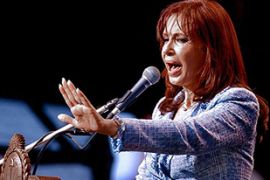Argentine leader eyes poll losses
President Cristina Fernandez’s party loses seats in Congress, early results show.

Kirchner was running for a congressional seat in Buenos Aires province, but with 27 per cent of votes there counted, he was trailing rival Francisco De Narvaez by nearly 32 per cent to 35 per cent.
‘Weakened majority’
“The party in power is losing seats and votes: it obtained 38.7 per cent of votes in the 2005 legislative elections against 25 per cent today. It keeps a relative majority, albeit weakened,” said Doris Capurro of the Ibarometro institute.
| In depth |
  Profile: Cristina Kirchner Profile: Cristina Kirchner Country profile: Argentina Country profile: Argentina |
Edgardo Mocca, a political science professor at the University of Buenos Aires, said the government’s political and economic course was at stake “because the parliamentary majorities depend on the continuation and advance of some politicians”.
Mocca said the election could mark a “model shift with respect to the neo-liberal policies that preceded it”.
Argentina once prided itself on having more in common with Europe than many of its troubled Latin American neighbours, but drug use in slums, widespread poverty and growing insecurity are continue to plague the nation’s 40 million people.
A scattered opposition of neo-liberals, social democrats and dissidents from the governing Peronist Party are threatening the Kirchner grip on power as the economic crisis takes a toll on the presidency.
Economic woes
Nestor Kirchner led Argentina from 2003 to 2007, when high world prices for the country’s exports led the economy to an annual growth of nine per cent, boosting his popularity and that of his wife.
But as world commodity prices collapsed, so did the popularity of the Kirchners.
Economists, citing figures disputed by the government, say the country will this year sink into recession.
Kirchner has defended the couple’s hegemony and its bid for industrial revitalisation, led by the auto industry, even as the president last year angered investors by nationalising the private pension fund system and the country’s largest airline.
In early June, the president announced Argentina would extend a $70m loan to support a local affiliate of General Motors, while its beleaguered parent company undergoes bankruptcy reorganisation.
Kirchner recently warned sceptical voters of the risk of a return to the economic crisis of 2001, the worst in the country’s history.
“It’s a choice between a return to the past and the consolidation of a national project,” he said.
Kirchner is still widely considered to be the main power-broker behind his wife’s administration.